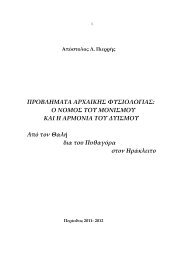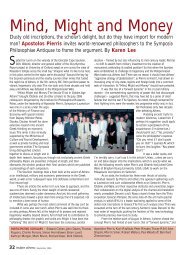APPENDIX C΄ ON DEPILATION: BODY COSMETICS IN CLASSICAL ...
APPENDIX C΄ ON DEPILATION: BODY COSMETICS IN CLASSICAL ...
APPENDIX C΄ ON DEPILATION: BODY COSMETICS IN CLASSICAL ...
You also want an ePaper? Increase the reach of your titles
YUMPU automatically turns print PDFs into web optimized ePapers that Google loves.
572 <strong>APPENDIX</strong> <strong>C΄</strong><br />
and, 122-3:<br />
apple¤ÌappleÂÈ ÛfÓ ‰ÔÚd ηd ¯ÂÚd appleÚ¿ÎÙÔÚÈ<br />
ıÔ‡ÚÈÔ˜ ùÚÓȘ T¢ÎÚ›‰’ âapple’ ·r·Ó,<br />
ÔåˆÓáÓ ‚·ÛÈÏÂf˜ ‚·ÛÈÏÂÜÛÈ ÓÂáÓ, ï ÎÂÏ·ÈÓfi˜, Ù’ âÍfiappleÈ àÚÁĘ,<br />
Ê·Ó¤ÓÙ˜ úÎÙ·Ú ÌÂÏ¿ıÚˆÓ, ¯ÂÚe˜ âÎ ‰ÔÚÈapple¿ÏÙÔ˘ etc.<br />
ΉÓe˜ ‰b ÛÙÚ·ÙfiÌ·ÓÙȘ å‰gÓ ‰‡Ô Ï‹Ì·ÛÈ ‰ÈÛÛÔf˜<br />
\AÙÚ›‰·˜ Ì·¯›ÌÔ˘˜, â‰¿Ë etc.<br />
There is no question of Menelaus not being valourous or strong or<br />
athletic. He is only irascible, less solid and ponderous than<br />
Agamemnon, and can be thus compared with apple‡Á·ÚÁÔ˜. (It may be<br />
significant that in Euripides, Orestes, 1584-5, Orestes calls on<br />
Menelaus thus:<br />
ÔyÙÔ˜ Û‡, ÎÏF‹ıÚˆÓ ÙáӉ Ìc „·‡ÛF˘ ¯ÂÚÔÖÓØ<br />
MÂӤϷÔÓ ÂrappleÔÓ, n˜ appleÂapple‡ÚÁˆÛ·È ıÚ¿ÛÂÈØ<br />
i.e. who are inflated and towering with insolent rashness; remember<br />
the Aristotelian «‰Èa Ùe ı¿ÚÛÔ˜» respecting the apple‡Á·ÚÁÔ˜).<br />
Similar remarks apply to Lycophron’s use of apple‡Á·ÚÁÔ˜ in reference<br />
to Paris. \AϤͷӉÚÔ˜, as his very name implies, was not an effeminate<br />
weakling. See, e.g. Apollodorus, Bibliotheca, III, 150: ÁÂÓfiÌÂÓÔ˜ ‰b<br />
Ó·ӛÛÎÔ˜ (sc. ï ¿ÚȘ), ηd appleÔÏÏáÓ ‰È·Ê¤ÚˆÓ οÏÏÂÈ Ù ηd ÚÒÌFË,<br />
·sıȘ \AϤͷӉÚÔ˜ appleÚÔÛˆÓÔÌ¿ÛıË, ÏFËÛÙa˜ àÌ˘ÓfiÌÂÓÔ˜ ηd ÙÔÖ˜<br />
appleÔÈÌÓ›ÔȘ àÏÂÍ‹Û·˜. Certainly he was exceedingly beautiful (‰ÖÔ˜ and<br />
ıÂÔÂȉ‹˜ are his standard epitheta in Homer; he was shining in his<br />
beauty, οÏÏÂ˚ ÛٛςˆÓ, Ilias, Γ, 392) and he was a natural seducer,<br />
with an innate eye as well as desire for women. (¢‡Ûapple·ÚÈ, Âr‰Ô˜ ôÚÈ-<br />
ÛÙÂ, Á˘Ó·ÈÌ·Ó¤˜, äappleÂÚÔappleÂ˘Ù¿ exclaims Hector chastising him, Ilias Γ,<br />
39; Ν, 769; we learn that ≥ (sc. Aphrodite) Ôî (sc. to Alexander) applefiÚÂ<br />
Ì·¯ÏÔÛ‡ÓËÓ àÏÂÁÂÈÓ‹Ó, Ilias, Ω, 30. His taste for women did not,<br />
however, monopolize his desires: Antheus was his beloved; v.<br />
Lycophron, 134 with the scholia), qualities, which made him the<br />
obvious choice as the judge of the beauty contest among the<br />
goddesses. He might have been, understandably, very conscious of his<br />
beauty’s preciosity, and therefore he could have been not particularly<br />
forward in continuously entering the battle (he would rather prefer to










